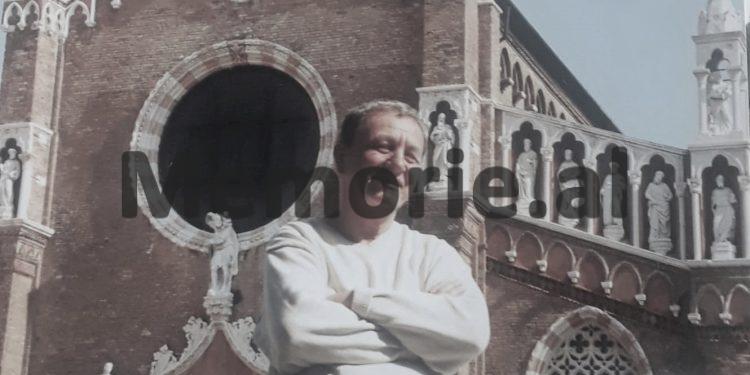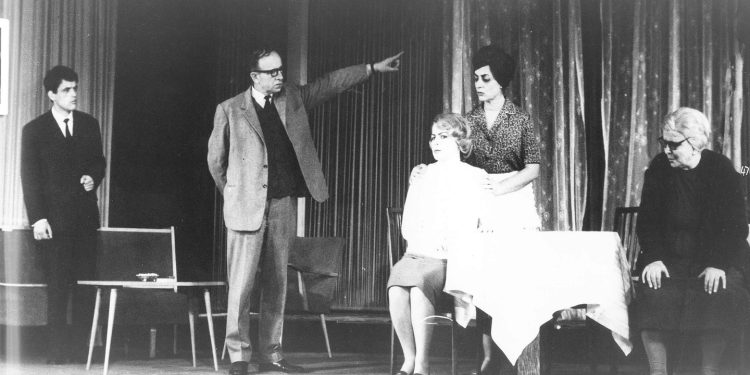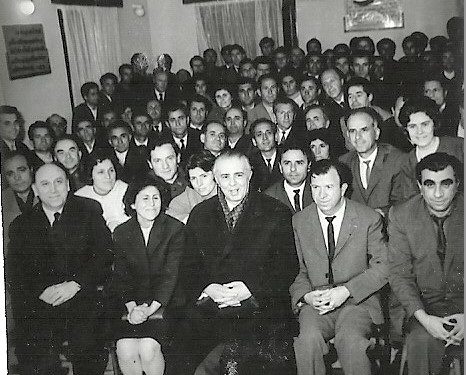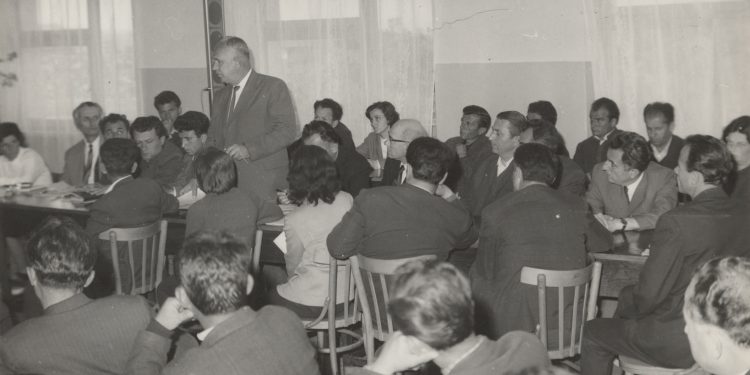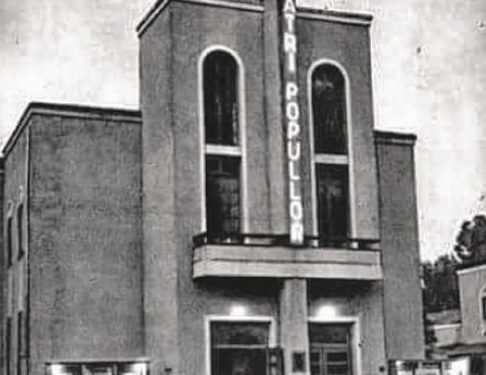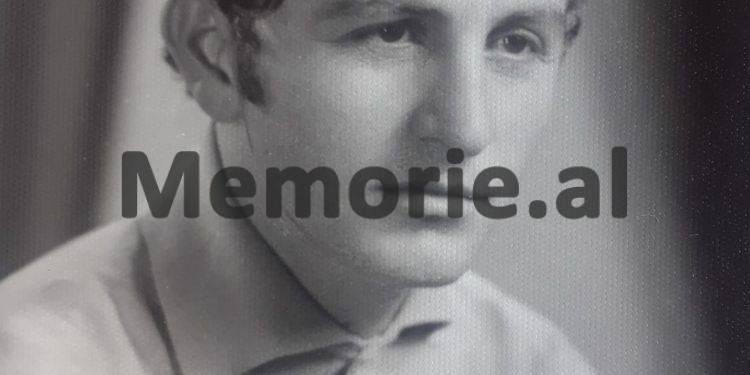By Bashkim Trenova
Part twenty-two
Memorie.al publishes the memoirs of the well-known journalist, publicist, translator, researcher, writer, playwright and diplomat, Bashkim Trenova, who after graduating from the Faculty of History and Philology of the State University of Tirana, in 1966 was appointed a journalist at Radio- Tirana in its Foreign Directorate, where he worked until 1975, when he was appointed as a journalist and head of the foreign editorial office of the newspaper ‘Zeri i Popullit’, a body of the Central Committee of the ALP. In the years 1984-1990, he served as chairman of the Publishing Branch in the General Directorate of State Archives and after the first free elections in Albania, in March 1991, he was appointed to the newspaper ‘Rilindja Demokratike’, initially as deputy / editor-in-chief and then its editor-in-chief, until 1994, when he was appointed to the Ministry of Foreign Affairs with the position of Press Director and spokesperson of that ministry. In 1997, Trenova was appointed Ambassador of Albania to the Kingdom of Belgium and to the Grand Duchy of Luxembourg. Unknown memories of Mr. Trenova, starting from the war period, his childhood, college years, professional career as a journalist and researcher at Radio Tirana, the newspaper ‘People’s Voice’ and the Central State Archive, where he served until the fall of the communist regime of Enver Hoxha, a period of time when he in different circumstances met many of his colleagues, suckers of some of the ‘reactionary families’, etc., whom he described with a rare skill in a book of memoirs published in 2012, entitled ‘Enemies of the people’ and now brings them to the readers of Memorie.al
Continued from the previous issue
“Enemies of the people”
Kadri Roshi returns to the stage of the People’s Theater with the amateurs of OAN where I also performed!
“Commissar Memo” also appeared in the hall of the People’s Theater. Success was complete and guaranteed. The workers, who filled the hall to the brim, had burst open the doors of the Theater to take their place even on foot to attend the spectacle. Kadriu was returning to the stage. Colleagues of his admirers also took place in the hall. Kadriu himself, after many years, when he mentioned that evening, says: “I still remember with gratitude those wonderful workers who loved family, work, art. Between them I took the bread out of my mouth for a year and a half. I went up to the stage with them again. We staged the drama “Commissar Memo” by Dritero Agolli on the stage of the People’s Theater. Even today when I remember that day I am overwhelmed by emotions. The spectators had torn down the doors and occupied the hall by overflowing it on foot. Behind the scenes in tears I kissed the stage like the believers of the Stone of the Kaaba. The moment came when I entered the stage. A barrage of applause and applause did not let me start the part. This atmosphere continued throughout the show and after it. A feeling I had never experienced in my life. “I cried more that day than I uttered words on stage.”
We did not win the Festival Flag this time. This is because the flag could not be given to a body where the main role was played by Kadri Roshi, who left the scene as a convict. Formally, the flag could not be awarded to the Construction Vehicles Workshop troupe because the lead role was played by a professional actor, while the festival was held for amateur theaters. This did not disappoint us much. We were rewarded and not bad, we were rewarded more than with a festival flag. After the show, Kadri Roshi came to the Office to celebrate the success and to share with us. He returned to the People’s Theater.
Before leaving, I gave Kadri some pictures, which were taken on stage after the show Georgi and Monika, two young West German Marxists-Leninists, who were working at the time for the German show on Radio Tirana. I had invited them to see “Fisheku në Pajë”. Kadriu looks sad in these photos. He was on stage just after the show, even after the curtain closed.
I last met Kadri Roshi in January 1994. The two of us once again went on stage together at the National Theater, which had organized a beautiful ceremony on the occasion of his 70th birthday. Many friends of Kadri’s benefactors, actors and writers spoke. After the occasional congratulations of the well-known Albanian writer, Dritero Agolli, I also stood up and said: “I have known him in the most difficult years and I think that the Albanian art and spectator, no matter how much they honor him, will be indebted to Kadri Roshi. He is a colossus who has contributed on stage and screen, not only with his colleagues, but also on the stage of the Albanian amateur theater. He worked with the construction vehicle company’s company team to stage two dramas, which today no one will remember, but for the workers of that company and their families, who came to this hall to see, those dramas remain unforgettable”.
Shortly before he left this life, on February 6, 2007, Kadri Roshin was asked if he had any regrets. The artist replied: “Debts. I owe a lot to my people. I’m so sorry I could not wash them. They have surrounded me all the time with love and warmth and today they surround me. People! Thank you. “I am grateful to you for my whole life.” The colossus thanks the people and not the false colossi, those who wanted to get him off the pedestal, but who themselves fell from there as criminals.
Arrival of Sevo Tarifa in OAN-for a meeting and conversation with the workers!
The Albanian Labor Party, like all communist parties, was held as the working class party, as the bearer and carrier of its ideology. She was in the role of guardian of the “purity”, ideology of the working class and society as a whole. To perform this role, in addition to the speeches and deeds or memoirs of the dictator, in addition to the press, propaganda, school, arts and culture, all these under the direct control of the Party, except those known as forms of political education, which were mandatory for to be followed in institutions and production centers, were also set in motion by conference speakers or employees of various levels of the communist pyramid. In the Construction Vehicle Workshop, one once came. His name was Sevo Tarifa. I did not know Sevo Tarifa personally. I had seen it once, about 20 years ago, when I joined the ranks of the Albanian Working Youth Union. He was in the presidium. I was told that he had graduated from the ‘Komsomol’ school in the Soviet Union. Sevo was the First Youth Secretary of the capital. Admissions were made in groups and every minute a new member of the Albanian Working Youth Union was added to the list. So, in a minute or so, my candidacy passed. In such a short time I could not even create any kind of impression on him.
Then I did not have the opportunity to meet him. I knew that he was the Secretary of the Party for propaganda in Gjirokastra, a city in southern Albania where the dictator Hoxha himself was originally from. He then joined the Central Committee of the Party in the group of instructors close to Enver Hoxha. Browsing the Albanian press of today, I read that Mr. Sevo Tarifa was no other, but simply “the multidimensional intellectual, the builder of new human souls …”, etc., etc. I do not know what to say. In the meeting he had with the workers of the Office he had not left this impression on me.
In this meeting Sevo Tarifa spoke about two ideologies, the progressive socialist and the regressive bourgeoisie in a fight for life or death with each other. As he put it, through ideological aggression, the bourgeoisie has achieved in the countries of the Soviet bloc “counter-revolutionary results which it could not have achieved either through armed intervention or through fascist aggression.” He told us that in the West the bourgeoisie, through loans, corrupted the workers, giving them the opportunity “to buy washing machines, televisions, etc …. to put an end to the class war.” Sevo Tarifa further spoke of fashion as “an important channel for the degeneration of the people through imperialist ideological aggression.” To argue this, he quoted Enver Hoxha, who had stated that the bourgeoisie appealed to the youth: “Give boys! To live in euphoria and joy, to entertain the youth, she loves the young and the modern! Who are these conservatives who prevent us from doing what we want? We want freedom and democracy, we want to make love on the streets and in public gardens, we boys, we want to wear long hair like women, we want to wear a cross pendant, go to church, see striptease numbers, have a car and then a plane. “The thermometer of ideological purity was the quotes of Enver Hoxha who, speaking e.g. regarding the long hair of young people, he said: “Will we young people allow long hair, which is so ugly? Jo”!
How did I manage to participate in the meeting with Enver Hoxha?!
While working in the Construction Vehicles Office, I was invited to a meeting with Enver Hoxha. The invitation was provided by my mother’s friend, Njazi Çepani, a veteran of the Second World War and, at that time, chairman of the Democratic Front of Neighborhood no. 3 where I also lived. The meeting took place at the Opera and Ballet Theater. Enver Hoxha would speak in front of the voters in the framework of the election campaign for deputies in the People’s Assembly. With the invitation in hand, I headed to the entrance of the Opera and Ballet Theater. There were 3 or 4 State Security employees, who checked the passport and invitation of the person who would be allowed to enter the hall. I gave them my passport and invitation. One of them, after verifying that it was me and that the invitation was made to me, said to me: “Go shave, then come and enter the hall.”As you are, with this hair, we will not allow you to be in a meeting with Comrade Enver”. I hurried to a nearby hairdresser at the beginning of Dibra Street, shaved according to the “norms” and returned to the Opera and Ballet Theater. When the Security Officer saw me, he recognized me, laughed victoriously and allowed me to enter the hall where hundreds of other participants in the meeting were waiting for the arrival of Enver Hoxha. So I sacrificed my hair for Enver Hoxha. If I did not do this, it would seem as if I did not want to meet him, as if for me the somewhat longer hair was more important than the meeting with the “legendary leader” and his word. In short, I could have consequences as well. Enver Hoxha himself, in his old age, when he was convinced that he was the only great Marxist philosopher of the time, let his hair grow and grow. Forget how ugly they had been! Security officers, but also Sevo Tarifa, had no way of knowing years ago that Enver Hoxha would one day, in the future, like long hair!
Sevo Tarifa, since Enver had not talked about pants, “enriched” him somewhat. In the small OAN canteen where we gathered to listen to him, he explained to us that holding pants with many pockets in the West, young people needed to put in one pocket the comb, in the other the mirror, and in the third pocket, the knife to commit crimes! These and other similar thoughts were published by Sevo Tarifa a year later in a pamphlet entitled “Ideological Aggression and the Fight against It”. Many things he did not say to the employees of the Construction Vehicle Office nor did him write them in the pamphlet he published. We can mention among them the well-known fact of cigarette smuggling committed by the Albanian communist state in cooperation with the Italian Mafia in the Adriatic Sea.
Criteria to be met by workers to obtain an authorization for a washing machine (washing machine)!
Sevo was applauded by the working class and was very pleased with the reception. After the workers left the hall, they started mocking and throwing stones, saying that bourgeois corruption is not bad, that the bourgeoisie with its aggression provided good material goods, such as cars, washing machines, televisions, etc., which were missing in Albania. . At that time there were very few Albanian families who had a washing machine in their homes. They, like televisions or refrigerators, were sold in very limited numbers, at certain times of the year, mostly on New Year’s Eve. They could only be purchased after obtaining appropriate authorization from the employment center or, for veterans, from the War Veterans Committee. Enterprises or institutions, if not all, were given 2-3 authorizations per year.
Thus, in order to “deserve” an authorization, you had to present a number of reasons before the Directorate and the Trade Unions, you had to be not only a distinguished employee, but also with a good political biography, possibly ill or have such a woman. Of course, in these circumstances, each presented his “reasons” and often against the reasons why the “competitors” did not deserve authorization. Explanations were often accompanied by false arguments or favorable situations, quarrels and quarrels between colleagues. Sevo Tarifa’s lecture, in this environment, could not but lead to the conclusion that, after all; the bourgeoisie was not the black devil! Sevo, practically, unintentionally, with what he said had served the “ideological aggression” of the bourgeoisie!
In the Albanian press I came across recently some information, which was about the Albanian ambassador in Washington, who had asked for a bribe from a businessman. His conversation with this businessman was recorded. The ambassador was called Fatos Tarifa. On this occasion he was also mentioned as the son of Sevo Tarifa. I felt sorry for the desolate Sevon, who had failed to persuade, at least his son, not to be corrupted by the bourgeoisie and to hold up the revolutionary spirit, the pure proletarian morality!
With ‘Working Control’, at the High Institute of Arts, ‘to keep the ideological line of the Party clean’!
To maintain “ideological purity”, the Labor Party of Albania, among others, organized what were called “Working Control Groups”. These groups were an imitation of the revolted revolutionaries of the Great Chinese Proletarian Cultural Revolution. There was, however, a difference. While in China the revolted Maoist revolutionaries hit the Chinese Communist Party, calling its structures “headquarters of the bourgeoisie”, in Albania, it was the Party that hit anyone and everywhere, according to political circumstances, internal difficulties, and existing relations between clans. The aim was to exert massive psychological terror, to remind ordinary people that the bread of their children depended on their level of acceptance of complete slavery, on the whipping of an ideology, at best utopian, without present and without future. The Maoist revolutionary rebels ultimately served the cult and power of Mao Zedong. The Workers’ Control Groups also served the cult of Enver Hoxha and his government.
Since I was officially training with the spirit of the class, with its ideology, I was assigned to participate in the control that would be done by this group at the Higher Institute of Construction as part of a group of workers from the Construction Vehicle Office Arts. As far as I remember, the group consisted of 5-6 people, all, except me, workers. We were asked to find the “redundant links” of organization and education, to discover what “dangers” threatened the employees of this Institute, who as artists, detached from life, were even more exposed than others to the ideological aggression of the bourgeoisie. ! Our labor control group was to revolutionize the atmosphere at the Institute.
None of our group had any pedagogical experience, none had any close or distant relationship with any artistic activity, no one had run in his life, no longer a chair where future artists were trained, or any mechanical department. We had, however, an indisputable advantage. At that time, the slogans “when the class speaks, the Party decides” or “when the class speaks, the bureaucracy is silent”, and the like were issued. We were “class”! If others were to speak, that is, to have different opinions from what we would give as conclusions, they could quite easily be labeled both “bureaucrats” and “comfortable” people, as “liberals”. , as “unformed”, as “intellectuals”. In short they could be labeled as affected, in one way or another, by the ideological aggression of the bourgeoisie. Such people had to be “cured” and the only effective treatment was to get them out of that job, to send them somewhere “close to life”, to get to know them, to the working class, to be re-educated with its spirit!
In our group there were generally people who did not seek to play the role of “hero” or “savior” of the individual or society from the danger of bourgeois degeneration. We had a fanatical communist, his name was Haki Shijaku. He was not one of those who have fanaticism as a mask to show their piety and gain any privilege. The case had brought him that during the war, the first issue of the newspaper “Zeri i Popullit”, a body of the Communist Party of Albania, was printed in his house. The years had passed and he had always remained a simple worker. The only “privilege” was that on the outer wall of his house, a plaque was placed saying that the first issue of the newspaper “Zeri i Popullit” was printed in that house, so he could be proud of this fact. In the preliminary discussions we had as a group to reach a common conclusion, Hakiu always insisted that this conclusion be as radical as possible. He must have thought that this was how he was doing a service to the Party, as he did that evening when the “Voice of the People” was published.
My speech with the conclusions as ‘Worker control’, in the hall of the Institute of Arts!
After a few days, our group presented its findings in a large, packed hall at the Higher Institute of Arts. Before drafting them, I had also talked privately with my uncle’s daughter, Glorian, who was a student of this Institute. From her I received some “confidential” data about the functioning of various departments, organization and workload in these departments; I was also informed about the “history” of their formation, etc. In the conclusions of the group, which I presented, we proposed to make some staff cuts, to make some reorganization of study disciplines, to see the old schemes of the functioning of the chairs of this Institute. I saw that the students were satisfied. They enthusiastically applauded, thus approving our proposals. Maybe they even settled some accounts with one of their lecturers! The management and teaching staff were not so enthusiastic and it is understandable. Their unspoken reservation was certainly related to the fate of everyone, so who would continue working there as before, who would move and where!?
I remember a former professor of physical education of mine in the years of high school, Abdulla Stërmasi was called, a good man, tall, healthy and strong. He stopped me when the meeting ended. He was worried. “That they do not remove me now on the eve of retirement,” he told me. I reassured my professor, telling him that the orientation is not to move, not to fire those who are on the verge of retirement. This is what we were told in the Party Committee, before we left as a control group in this Institute. We conveyed this message to the leaders of the Higher Institute of Arts.
It is interesting when you recall today that, ‘Working control groups’, were sent everywhere, throughout Albania, in all the links of the administrative-state system, but never in the links of the party organization. No worker control has been done in the party committees of the districts or regions, so as not to climb to the apparatus of the Central Committee of the Party, from where the enemies and traitors have not stopped coming out, during all the years of communism in power. If we go with the logic of the time and accept it as normal, it must be said that it is precisely this lack of control by the working class that has made “betrayal” flourish in the highest spheres of the communist pyramid in Albania, excluding the dictator.
But why did the Party not accept “workers’ control” or, in other words, the “voice of the class”, in order to maintain ideological purity even in its highest ranks? Why two standards for the same problem, which served as vital to the fates of revolution and socialism at a time when it was, said that no one is immune from the ideological aggression of the bourgeoisie, that no one is infallible and that only the working class is wrong? Simply because the “voice of the class” was the voice of the Party and that the voice of the Party was the voice of Enver Hoxha. That’s why he did not need the “voice of the class”. He needed this voice simply as a mask to wear a democratic, popular garment, the savagery of what was known as the dictatorship of the proletariat. Had he not said that the dictatorship of the proletariat is the real democracy, it is the democracy of the masses of millions?! Why did he not say that proletarian democracy is the real democracy, the democracy of the masses of millions?! Simply because such a democracy neither existed nor needed the Working Class Party, as all communist parties claimed to be. Memorie.al
The next issue follows




